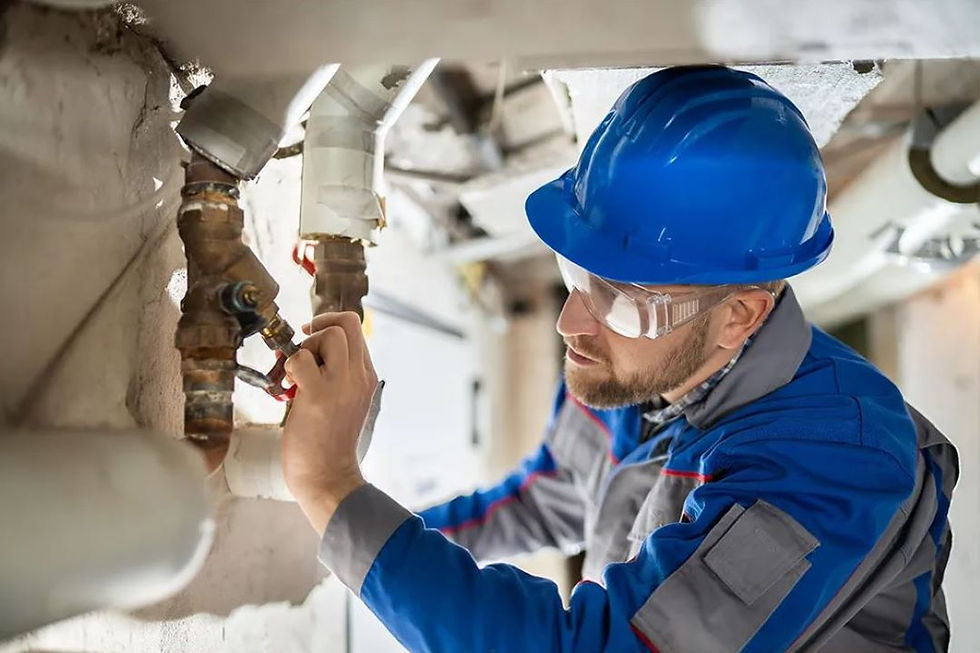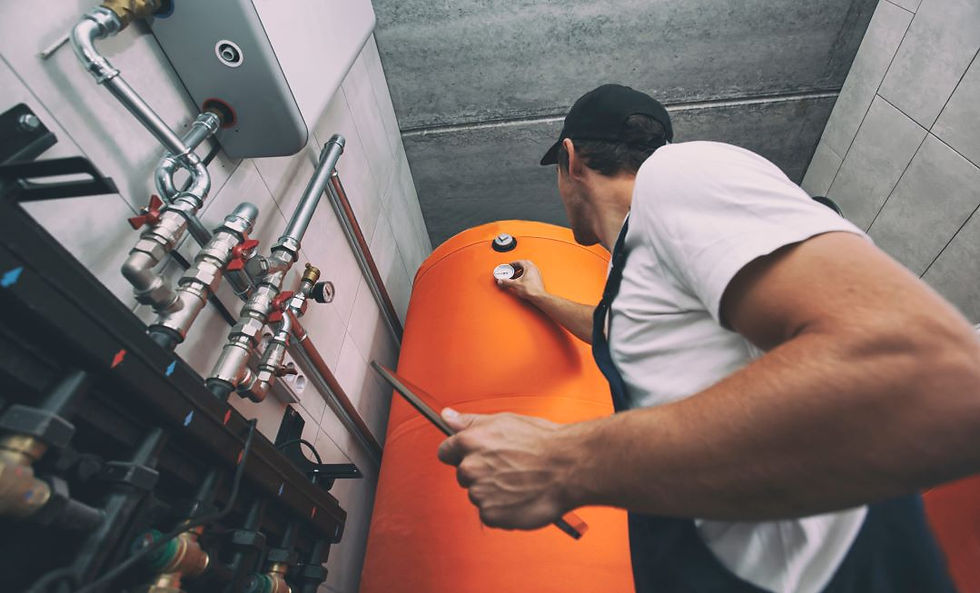How Often Should You Get Your Water Pipes Inspected?
- Zack Woo
- Mar 20
- 7 min read

You should get your water pipes inspected regularly every one to two years to ensure the efficiency and safety of your plumbing systems. A typical plumbing pipework inspection includes a thorough visual inspection of your pipes, water heater, and other components.
Employing a plumber's expertise such as Thong Nian Engineering and a detailed plumbing inspection checklist, regular plumbing inspections will help to identify potential issues early and maintain the overall health of your plumbing systems.

How often should I have a pipe inspection?
You should have a pipe inspection every one to two years to ensure the longevity and functionality of your plumbing systems.
Regular plumbing inspections help identify potential issues before they escalate into costly repairs.
During a plumbing inspection, a professional will conduct a thorough visual inspection of your pipes, joints, and fixtures, checking for leaks, corrosion, or blockages.
Consistent and timely plumbing inspections are essential to maintaining the health of your home's plumbing system.

What to look for as possible problems during pipe inspection?: Plumbing Inspection Checklist
During pipe inspection, it is important to look out for several key issues as possible problems. Firstly, check the water heater for any signs of wear or leaks as part of your plumbing inspection checklist.
Ensure the sump pit and sump pump are functioning correctly to prevent basement flooding. Examine the water flow and verify the pressure gauge readings to make certain they are within the normal range.
Inspect the kitchen sink and dishwasher discharge for clogs or leaks. Pay close attention to p trap fittings for any evidence of water leaks or improper installation.

Check the water drains and water supply lines for blockages or corrosion. Assess the wall thickness of your pipes to detect any signs of deterioration.
Ensure water valves are functioning properly and that all valves are tightly sealed to avoid leaks. Don't forget to inspect the water dispenser and strainer basket in your sinks.
Lastly, visually inspect the entire system for any obvious issues, including the condition of the p trap to prevent sewer gas from entering the home.
Following this comprehensive piping inspection procedure ensures your plumbing system's longevity and efficiency.

What to expect during a plumbing inspection?
During a plumbing inspection, you can expect that the inspector will thoroughly evaluate your entire piping system.
This includes checking for potential gas leaks and examining both the cold water inlet pipe and the hot water exit pipe to ensure they are functioning properly.
Regular plumbing inspections are essential for maintaining optimal water pressure throughout your home and preventing future issues.
The inspector will also check your sink drains, including the kitchen sink drain, to make sure they are clear of any blockages. Additionally, attention will be given to the water heater to verify its efficiency and safety.
By routinely inspecting these components, you can ensure the longevity and reliability of your plumbing systems.

Numerous Advantages to Plumbing Inspection
Numerous advantages to plumbing inspection include prevention of water wastage, reduced water bills and the removal of clogging, backups or blockages.
Regular plumbing inspections can help detect issues such as leaks or clogs early on, preventing costly emergency repairs down the line.
During a plumbing inspection, professionals will check several critical components, including the water heater, water pressure, and water supply hose, ensuring everything functions efficiently.
Outdoor hose spigots and water hoses are also examined to prevent external leaks that can contribute to water wastage.
Inspecting your sink faucet can help address minor drips that, over time, can lead to significant water loss and increased bills.
Additionally, a thorough inspection includes checking the septic system, ensuring no backups or blockages.
Overall, plumbing inspections provide peace of mind, safeguarding your home against potential plumbing disasters.

What is the plumbing inspection cost for water pipes in Singapore?
In Singapore, the plumbing inspection cost for water pipes is typically around $150 to $300, depending on the complexity and scope of the inspection process.
For residents near Jurong East, the plumbing inspection cost can range within these similar amounts, ensuring a thorough plumbing inspection is accessible for this locality.
A sewer line camera inspection, often required to diagnose issues in sewer systems or to check for integrity, generally costs between $250 to $500.
During a plumbing inspection, professionals will check for water pressure, leaks, and the functionality of branch shutoff valves.
Attention is also given to the kitchen sink drain regularly, the hot water exit pipe, and other essential components like the sump pump, under floor drainage system, and sump pit.
Properly conducted inspections can prevent the intrusion of sewer gases and ensure the efficient operation of the septic system.
Additionally, the inspection covers other critical areas such as sink faucets and pipelines to provide comprehensive evaluations.
How much does pipe inspection cost?
In Singapore, pipe inspection costs typically range from SGD 150 to SGD 500 on average, depending on various factors.
The length of the sewer system plays a significant role, as longer plumbing systems require more time and effort to inspect thoroughly.
Ease of access is another critical factor; hard-to-reach areas or complex layouts can increase costs.
The type of inspection, such as video camera inspections or manual evaluations, and the scope of services—whether it involves a basic plumbing inspection checklist or a comprehensive review—will also affect the pricing.
Additional services, like repairs for plumbing problems or emergency after-hours calls, can further increase the overall expenses.
To save money, homeowners are encouraged to schedule annual inspections and consider service packages offered by plumbing companies, as these often include discounted rates and help maintain optimal water pressure and system functionality.
By addressing potential repair costs early, you can ensure long-term efficiency and avoid more significant issues within your plumbing system.

How often do pipes need to be checked?
Pipes need to be checked every two years to ensure the integrity and functionality of your plumbing system. During an inspection, it is crucial to examine tubs drain efficiency, wax ring conditions, and shutoff valves operation.
Inspecting water valves and wall thickness can help identify potential weak points. Loose fittings and calcium buildup are common issues that can lead to leaks and water damage if not addressed promptly.
Loose fittings cause water leaks. If you are interested to know more, these are the the 10 most common causes of leaky pipes, 7 easy ways to detect a water leak and fix it.
Utilizing a pressure gauge can help monitor the system's pressure levels. Checking the proper function of garbage disposal units and sink drains is also essential.
Additionally, inspecting the septic tank, including the tank lid and tank system, ensures that there are no gas leaks or other issues. In addition, here are some tips on how to find a water leak in your house!
Regular inspection of shutoff valves and other components can prevent major problems and extend the lifespan of your pipe system.

How often should water pipes be cleaned?
Water pipes should be cleaned every 12 to 18 months to prevent water stains and water damage. Regular plumbing inspections are crucial for maintaining a healthy home's plumbing system.
During an inspection, it's vital to look for corrosion, leaks, and loose fittings. Visually inspect your piping system, vent pipes, and drain connections.
Pay close attention to outdoor spigots and kitchen sink drains, as these areas are prone to plumbing problems. Check the dishwasher discharge, garbage disposal, and P trap fittings for any blockages.
Regularly cleaning the kitchen sink drain and using a proper drain blocker can help maintain water flow. Addressing dripping faucets and ensuring proper dishwater discharge can prevent emergency repairs and reduce repair costs.
Leaking pipes and dripping faucets are common issues. These are the top 5 reasons you should fix leaky pipes and dripping faucets!
Want to learn more about what are the impacts of water leaks & why you should not ignore them? Read our easy article to gauge a better understanding!
Overall, consistent maintenance and inspection of your water pipes are essential to avoid potential issues and maintain efficient water supply throughout your home.
Why do pipes need to be inspected?
Pipes need to be inspected because catching early signs of water stains, water damage, or corrosion can prevent significant plumbing problems down the line.
During an inspection, a professional will visually inspect the entire piping system, searching for leaks, loose fittings, and issues with the water supply.
They will also examine vent pipes, drain connections, and outdoor spigots to ensure everything is functioning correctly.
Routine maintenance and thorough inspections help identify potential problems early, ensuring your plumbing system remains efficient and reliable.
There are numerous issues that can arise from pipes, but what counts as a plumbing emergency? Read this article to find out!
How often do pipes need to be replaced?: Drainage, Plumbing System and Sewer lines Pipe Inspections for Residential and Commercial Buildings
Pipes need to be replaced every 20-50 years, depending on the material and usage.
For drainage and plumbing systems in residential and commercial buildings, regular inspection of corrosion, pipe integrity, and leaks is crucial to avoid water damage.
Visual inspection around the toilet base and strainer area should be routinely performed. Specifically, the p trap and the sewer main should be checked for any water stains or damage signs.
The drain field may also exhibit issues, often highlighted by water backing up into sinks and other fixtures.
Ensuring the valves tightly shut is crucial to prevent calcium buildup and other obstructions.
Loose fittings not only cause the buildup of calcium, but they are also prone to water leak detection.
Read this article to understand what are the tools and techniques for water leak detection! Moreover, inspecting the water valves, water dispenser, and strainer basket can reveal underlying problems.
Wall thickness and overall condition of the pipes are critical indicators during these assessments. In cold climates, water supply and water drains are prone to freezing and should be examined carefully.
Scheduling your next inspection proactively and maintaining a checklist can help in early detection and prevention of costly repairs.

Comments